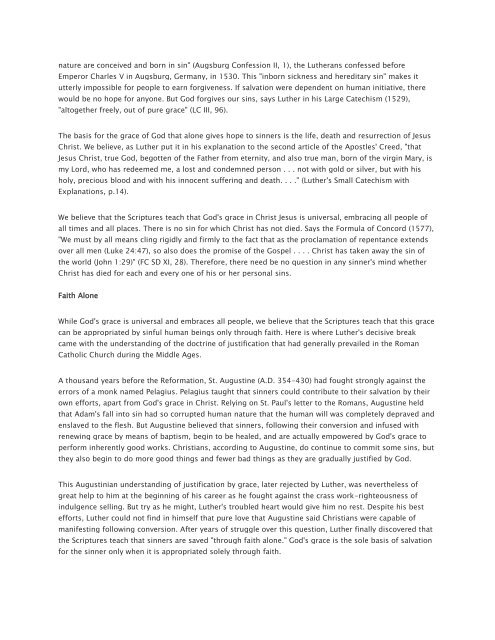What do Lutherans believe? - The Lutheran Church—Missouri Synod
What do Lutherans believe? - The Lutheran Church—Missouri Synod
What do Lutherans believe? - The Lutheran Church—Missouri Synod
You also want an ePaper? Increase the reach of your titles
YUMPU automatically turns print PDFs into web optimized ePapers that Google loves.
nature are conceived and born in sin" (Augsburg Confession II, 1), the <strong><strong>Lutheran</strong>s</strong> confessed before<br />
Emperor Charles V in Augsburg, Germany, in 1530. This "inborn sickness and hereditary sin" makes it<br />
utterly impossible for people to earn forgiveness. If salvation were dependent on human initiative, there<br />
would be no hope for anyone. But God forgives our sins, says Luther in his Large Catechism (1529),<br />
"altogether freely, out of pure grace" (LC III, 96).<br />
<strong>The</strong> basis for the grace of God that alone gives hope to sinners is the life, death and resurrection of Jesus<br />
Christ. We <strong>believe</strong>, as Luther put it in his explanation to the second article of the Apostles' Creed, "that<br />
Jesus Christ, true God, begotten of the Father from eternity, and also true man, born of the virgin Mary, is<br />
my Lord, who has redeemed me, a lost and condemned person . . . not with gold or silver, but with his<br />
holy, precious blood and with his innocent suffering and death. . . ." (Luther's Small Catechism with<br />
Explanations, p.14).<br />
We <strong>believe</strong> that the Scriptures teach that God's grace in Christ Jesus is universal, embracing all people of<br />
all times and all places. <strong>The</strong>re is no sin for which Christ has not died. Says the Formula of Concord (1577),<br />
"We must by all means cling rigidly and firmly to the fact that as the proclamation of repentance extends<br />
over all men (Luke 24:47), so also <strong>do</strong>es the promise of the Gospel . . . . Christ has taken away the sin of<br />
the world (John 1:29)" (FC SD XI, 28). <strong>The</strong>refore, there need be no question in any sinner's mind whether<br />
Christ has died for each and every one of his or her personal sins.<br />
Faith Alone<br />
While God's grace is universal and embraces all people, we <strong>believe</strong> that the Scriptures teach that this grace<br />
can be appropriated by sinful human beings only through faith. Here is where Luther's decisive break<br />
came with the understanding of the <strong>do</strong>ctrine of justification that had generally prevailed in the Roman<br />
Catholic Church during the Middle Ages.<br />
A thousand years before the Reformation, St. Augustine (A.D. 354-430) had fought strongly against the<br />
errors of a monk named Pelagius. Pelagius taught that sinners could contribute to their salvation by their<br />
own efforts, apart from God's grace in Christ. Relying on St. Paul's letter to the Romans, Augustine held<br />
that Adam's fall into sin had so corrupted human nature that the human will was completely depraved and<br />
enslaved to the flesh. But Augustine <strong>believe</strong>d that sinners, following their conversion and infused with<br />
renewing grace by means of baptism, begin to be healed, and are actually empowered by God's grace to<br />
perform inherently good works. Christians, according to Augustine, <strong>do</strong> continue to commit some sins, but<br />
they also begin to <strong>do</strong> more good things and fewer bad things as they are gradually justified by God.<br />
This Augustinian understanding of justification by grace, later rejected by Luther, was nevertheless of<br />
great help to him at the beginning of his career as he fought against the crass work-righteousness of<br />
indulgence selling. But try as he might, Luther's troubled heart would give him no rest. Despite his best<br />
efforts, Luther could not find in himself that pure love that Augustine said Christians were capable of<br />
manifesting following conversion. After years of struggle over this question, Luther finally discovered that<br />
the Scriptures teach that sinners are saved "through faith alone." God's grace is the sole basis of salvation<br />
for the sinner only when it is appropriated solely through faith.


